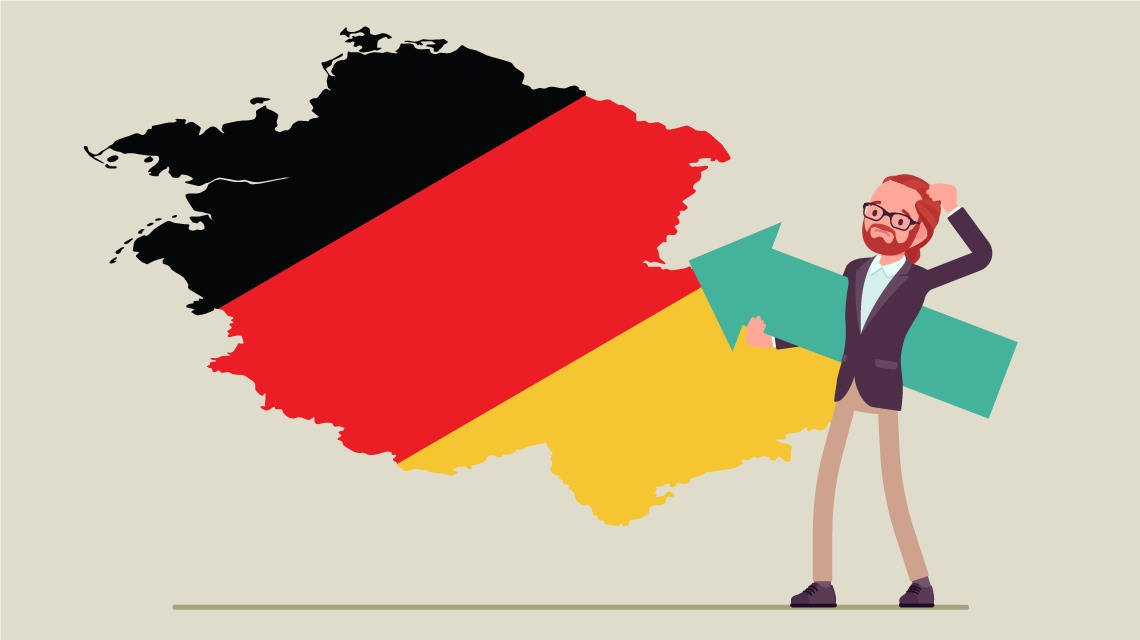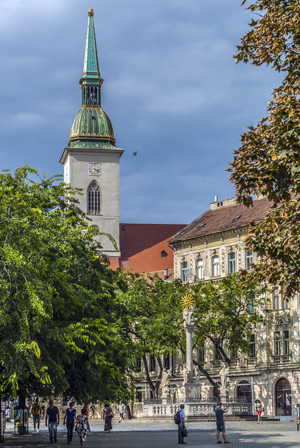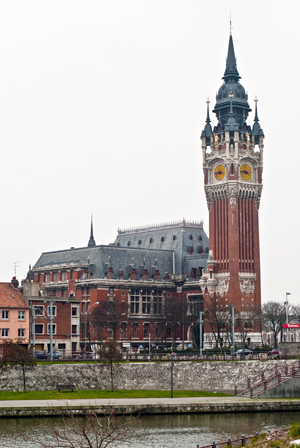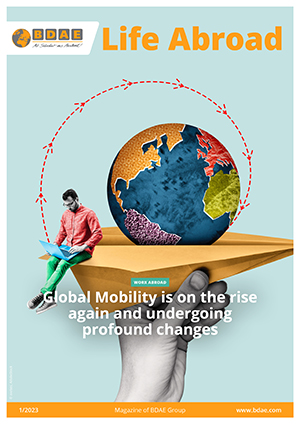"There are many ways to prepare your return"
Mona Gabriel has lived abroad several times in her life and experienced the ups and downs of expat life since childhood. In the interview, she talks about how her book, which will be published in the spring of 2022, came about, why it is useful to consider the return before leaving, and what to generally keep in mind.
What ultimately prompted you to write a book about reverse culture shock?
Mona: I've been working in the publishing industry for quite some time, and like many others, I've always had a desire to write something myself. However, I wasn't particularly drawn to writing non-fiction. But as someone who's been moving around a lot due to my family circumstances, the theme of the "return problem" has been a recurring issue in my life. As a child and teenager, I didn't really reflect on it, but I often struggled with it and found many things to be confusing. It wasn't until later in life, when I was living with my family in Bratislava, that I became aware of the concept of "Third Culture Kids". This was a revelation for me, as it helped me understand many things about myself that I had previously struggled with.
After returning to Germany from Bratislava, I realized that leaving was always easy for me. I could always start fresh and organize myself well. However, I found coming back much more difficult and began to wonder why. I discussed this with people in my environment here in Leipzig, as well as my circle of friends who had also been away for a long time. We discovered that for most people, returning was much more challenging and draining than leaving. When I looked for literature on the subject, I found that there was no substantial research or resources available. While there were a few niche topics in German and some literature in English, nothing really addressed the issue in depth. That's when I realized that if I wanted to learn more about this topic, I would have to research and write about it myself.
Whenever I face challenges in life, my go-to solution is to reach for a book and start reading.
I began to look for people to interview and I started doing my research. And in 2019/2020, I started writing.
 During her time in Slovakia, the country was undergoing major changes. Bratislava, Slovakia © Elsworth Frobisher, TheWorldPhotoTour.com
During her time in Slovakia, the country was undergoing major changes. Bratislava, Slovakia © Elsworth Frobisher, TheWorldPhotoTour.com
Based on your personal experiences as a returnee, have you developed your own protective mechanisms for dealing with coming back? What has helped you cope in difficult situations?
Mona: One of the ways I found to make it easier is that I don’t immediately tell people that I just returned from abroad. I noticed that when I do, there are usually two types of reactions. Some find it exciting and tend to ask a lot of questions, but I don't always feel like discussing it and prefer to talk about other topics. Others seem completely overwhelmed and unsure of how to proceed with the conversation. As a result, I tend to mention it in small doses throughout the conversation rather than all at once, allowing it to come up naturally over time.
In your book, you point out that it makes sense to deal with the issue of returning to one's home country before leaving for another country. Why?
Mona: Depending on your personal circumstances, there are several factors to consider before returning to your home country after living abroad. For instance, if you have children, it's important to think about their age and when might be a good time to return. If they are in their teenage years, unpreparedness can lead to challenges and stress, which you would have to face alone. Therefore, it's crucial to plan ahead and consider important decisions like which school to send them to or whether to return to the same city.
It's also advisable to clarify professional matters beforehand, if possible. In many cases, one partner, often women, may not be able to work abroad. Having an idea of your desired career path can help you use your time abroad to network, make contacts, or pursue further education. This can be particularly beneficial if returning to your previous employer is not an option. Bear in mind that German companies may not be equipped to handle resumes with gaps, so it's wise to think about these things in advance.
 © andrew_rybalko, AdobeStock
© andrew_rybalko, AdobeStock
Apart from organizational matters, it is also important to consider before returning whether to return to the same place or go somewhere else. In this case, it is important that if a family goes abroad, everyone talks to each other - especially if there are uncertainties. Do I want to return to the same place as a security or for the sake of the children, because they still have their friends there? Sometimes you need that, but when you are away, you may realize that you don't want to go back to the same environment. I think it is important to talk about this before and during the stay abroad. It is not good if a decision comes out of nowhere. If the situation develops differently professionally and the children rely on returning to the same place. That is difficult. It should be accompanied in the long term.
Another aspect that I was not so aware of before is that when a family or couple goes abroad and the work situation changes, it also affects the relationship, the division of labor, and self-esteem. If, during the stay abroad, only one parent takes care of the children and the other works, but afterwards, both want to work, this should also be discussed together. People quickly get used to the roles that have developed during that time and cannot assume that everyone involved can understand it just because they imagined it that way in their heads. Stays abroad are also big crises and stress factors for a relationship.
Let's take up the term "third culture kids" again. What is actually meant by this and what advantages, but also problems, arise in this context?
Mona: Third culture kids are individuals who spend a significant part of their childhood or adolescence in a foreign country, leading to an inadvertent integration of the host culture into their identity. Such experiences have a lasting impact on their personality development, distinguishing them from adults in this aspect.
They often bring back a new language and a range of cultural experiences, making them more open to exploring the world. Parents who raise their children this way must be prepared for the possibility that their children may choose to live abroad. However, sharing their experiences with others can be challenging, as they may be viewed as showing off or trying to impress others, even though these experiences are all they know.
"There are many good books on the subject of Third Culture Kids and also more research than on the subject of return shock."
 Bratislava, Slovakia © Elsworth Frobisher, TheWorldPhotoTour.com
Bratislava, Slovakia © Elsworth Frobisher, TheWorldPhotoTour.com
Third Culture Kids often struggle with a sense of home, having moved frequently during their upbringing. They may find it difficult to answer the question "Where are you from?" due to the complex nature of their upbringing. Identity crises are common among Third Culture Kids, especially during their transition into young adulthood, where they may not know where they truly belong. Being multilingual also adds a unique dimension to their personality, sometimes resulting in a "language salad" in their minds.
By reading literature on the subject, one can gain a better understanding of the challenges faced by Third Culture Kids, including the identity crisis and the complexity of language acquisition. For example, speaking different languages can lead to changes in one's personality, which may not have been apparent otherwise.
Are your children "Third Culture Kids"?
Mona: Absolutely, without a doubt. My daughter resides in the Netherlands and has no intention of returning. Having studied European and international law, she now lives in The Hague. Meanwhile, my son resides in Vienna and has a strong interest in the former Eastern Bloc and Balkan states, finding them entirely fascinating.
To be honest, we never really considered these possibilities when we initially sent our children to the International School. At the time, we simply thought they could study anywhere, even in Germany. However, we failed to consider that earning an international degree from such a school would lead them to lose interest in studying in Germany. As a result, both of our children have stated that they can go anywhere in the world, which they have since done. Unfortunately, as parents, we have little say in the matter. We have become humble and content knowing that they are presently on the same continent. However, they have both traveled far away, to Japan and Australia, which I found to be less than ideal.
When you went to Bratislava with your family, which was your last longer stay abroad, how old were your children at that time and did that present a special challenge for the whole family, especially the return to Germany?
Mona: In 2005, we moved to Bratislava due to my husband's job, our children being of primary school age. At the time, my son was 8 and my daughter was 6. While we were not familiar with the city beforehand, we ended up enjoying our stay there. Slovakia was still undergoing significant changes at that time, and it felt like we were truly living abroad. It was exciting to witness the upheaval and the newness of everything, which was quite different from what we were used to in West Germany.
Although we had the option to extend our stay, we ultimately decided to return to Germany in 2008. Our children were three years older by then, and we returned in the middle of the school year. We enrolled them in an international school in Germany, which was more expensive but offered continuity in terms of the school system and language of instruction.
Having experienced difficulties myself when returning to Germany from France as a child, I was aware of the potential challenges that our children might face if we had enrolled them in a "normal" German school. Adolescence is a difficult time, and I didn't want to risk them struggling with a new school system and language at such a critical juncture. By enrolling them in an international school, they were able to continue with the same language and education system, making the transition much smoother for them. Ultimately, it was a decision that worked out well for all of us.
What were important aspects that you learned from your stays abroad?
Mona: Moving around frequently has led me to develop some unique habits and behaviors that differ from those of most people in Germany. At times, it can be challenging to determine which aspects of my personality are truly my own, and which ones I may have picked up from different places and cultures.
Navigating social situations can also be tricky, as I may be uncertain about how to act in certain contexts. However, this constant exposure to different ways of living has also given me a sense of freedom to choose how I want to behave and live my life. By experiencing different cultures and finding aspects that resonate with me, I can incorporate those into my own identity and way of being.
While this approach can lead to some bumps in the road, it ultimately allows me to live a more authentic and fulfilling life, guided by my own values and preferences rather than societal expectations.
"You get to make it what feels good for you."
 France was also a stop abroad for Mona Gabriel during her childhood and adolescence. Calais, France© Elsworth Frobisher, TheWorldPhototour.com
France was also a stop abroad for Mona Gabriel during her childhood and adolescence. Calais, France© Elsworth Frobisher, TheWorldPhototour.com
Creating a sense of home in a new place requires certain conditions, such as feeling secure and having suitable housing. However, it also involves building a community and taking on some responsibility, whether that's through a neighborhood garden or participation in local government. Emotionally, you need to feel a connection to the people and the place in order to feel at home.
While people who stay in one place for a long time often develop a natural emotional attachment to their surroundings, those who move frequently may need to invest more effort in building connections. By actively seeking out opportunities to connect with others and take on responsibility, you can gradually develop a sense of belonging in your new location. This approach is especially important in today's world, where many people move frequently or as part of immigration.
Rather than focusing on how long you will be in one place, it's more productive to ask yourself how you can connect with people and take on responsibility in a way that feels meaningful. By doing so, you can create a sense of home that transcends any specific location or timeframe.
A return from abroad is generally managed differently. This process, as you describe in your book, follows certain phases. What are they?
Mona: Moving to a new country can be exciting at first, as you enjoy discovering new things and sharing your experiences with others. However, as time passes and the initial enthusiasm fades, you may start to feel disillusioned and exhausted with the challenges of everyday life. This can lead to a sense of alienation and inner distance, especially if others around you lose interest in your experiences.
Your personality also influences how you cope with these challenges. It's important to figure out what you want and communicate it clearly to others. However, the constant need to plan and adapt can be stressful, and you may need to take time to reflect on your own feelings and priorities. Ultimately, finding a balance between exploring your new surroundings and taking care of your own well-being is key to thriving in a new country.
How do companies and organisations deal with the reintegration of returnees from abroad?
Mona: In many companies, there is no general interest in people with experience abroad. It's so absurd, considering what expatriate assignments cost companies. It's incredibly expensive to send people somewhere, to pay for school, to move the family, etcetera.
Everyone is supposed to have experience abroad, but when someone comes back from abroad, they don't know what to do with it. It is contradictory. A lot of money is spent, but they couldn't benefit from the knowledge.
Do you know of companies that specialise in offering coaching for returnees and have you ever thought about offering it?
Mona: Yes, but unfortunately, there are very few resources available for sending and return coaching, or for regular gatherings where returnees can exchange ideas. This is a big exception, given the large number of people who return to Germany each year. In 2020 alone, there were 190,000 returnees, and in previous years, the number has always been well over 100,000.
While there are some psychologists who specialize in helping returnees, they are a small group compared to the number of people who could benefit from their support. I have been in talks with organizations that arrange stays abroad for young people, such as high school year programs and au pair placements. They are interested in providing support for their returnees, and we are exploring the possibility of developing a coaching series for them.
Similarly, I am also interested in working with an organization that supports people returning to Germany at retirement age. The needs of this group are quite different, and it's still in the early stages of discussion. However, I am passionate about creating resources to support returnees and hope to contribute to this effort in the future.
What do you think is important to consider when you go abroad and then come back after a while?
Mona: Traveling to another country requires you to step out of your comfort zone and adapt to new surroundings. While the experience can be exhilarating, it may also take some time to get used to the unfamiliar. After returning home, it's possible to feel disconnected from your old life after having spent so much time away. You may have settled into a new routine, but it's important to be mindful of not getting too comfortable and losing the motivation to explore new experiences. It's crucial to avoid leaving again for the wrong reasons or missing out on opportunities to grow and challenge yourself.
"You are responsible for your own entertainment."
In moments like these, it's important to explore the opportunities that your environment offers and consider what you can change or learn. Whether it's discovering new places, trying a new sport, or surrounding yourself with positive people, there's something for everyone in Germany. And if you're still craving adventure, traveling is always an option. It's up to you to take responsibility for your own entertainment and make the most of the resources available.
 Kaysersberg, France © Elsworth Frobisher, TheWorldPhotoTour.com
Kaysersberg, France © Elsworth Frobisher, TheWorldPhotoTour.com
For young people who have returned from a year abroad to start university, the transition may not be as challenging since they have the opportunity to meet new people during their studies. However, for those who are uncertain about their future plans, the return shock can be more intense. This is especially true for Third Culture Kids, who may feel a strong desire to leave the country again after some time. Nevertheless, there often comes a point when the desire to stay outweighs the urge to leave.
Some people can't really understand what it's actually like to return from abroad. Have you had any negative experiences yourself?
Mona: When I told people what my book was about, they often responded with a smile and disbelief, saying things such as, "It can't be that bad with the return shock, you know what you signed up for. Isn't that a bit exaggerated?". Those comments would leave me speechless. Over time, I developed a response. Psychologists I spoke to, especially Prof. Dr. Genkova, who researches this extensively, told me that the experience of returning from abroad, especially if you enjoyed living there, is similar to a separation crisis. It's like ending a relationship or experiencing the death of a loved one, and the psychological pain and challenges are just as significant. When someone dismisses those feelings and tells you to just get over it, it can be incredibly hurtful. While going abroad is often seen as a privilege, it also comes with its own set of problems and difficulties. Others may not fully understand that you are losing a home, your everyday life, your friends, and your neighbours. It's painful. Those who have experienced it understand it immediately, while others may only be able to empathize to some degree or not at all. Ultimately, you can only fully comprehend the experience if you've lived through it yourself.
It's essential to acknowledge the significant emotional toll of returning to your home country and communicate it with yourself and those around you. It's natural to feel a sense of loss and sadness for the things that were a part of your everyday life before. In fact, if you didn't miss anything, it would imply that you didn't find anything worthwhile during your time abroad.
"Returning home after being abroad can be emotionally challenging, and it's important to acknowledge and communicate this. "
Families can encounter difficulties when it comes to moving abroad. In my own family, this is not an issue because we are all used to relocating frequently. However, for families who are firmly rooted in one place, it can be more challenging to gain a mutual understanding. This lack of understanding can even cause division, as it may be interpreted negatively, with comments such as "Aren't we good enough for you?" or "You chose this lifestyle, so you can't complain."
Are there things that have stuck in your mind and made you smile when you have talked about the topic of foreign countries with other people, acquaintances, friends, or family?
Mona: When my son returned from his study abroad program in Japan, I picked him up from the airport and asked if Japan was everything he had imagined it to be. He looked at me and simply said, "Mom, you can't even imagine."
After returning from Slovakia, I met up with some girlfriends and drove us in my car. One of my close friends commented on my driving and said, "Well, you've become quite 'Slovakised' behind the wheel." It was amusing to me that the more reckless and rule-breaking driving style of Slovakia had rubbed off on me.
To this day, our family still uses a certain saying when dealing with complicated German bureaucracy or technology: "Do we have a Slovakian way to deal with that?"
And finally, one more question. Do you have plans to go abroad again for a longer period of time?
Mona: While I don't have any specific plans, I feel the need to explore and will be traveling to Canada for a month this year. It has become clear to me that I crave new experiences. Although I'm not completely set on the idea, I wouldn't dismiss the possibility of embarking on a longer journey in the future.



